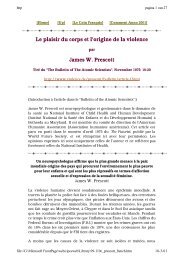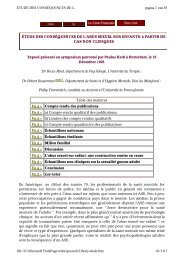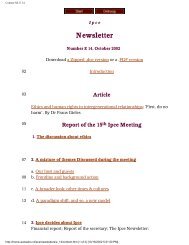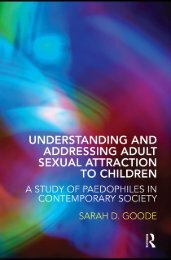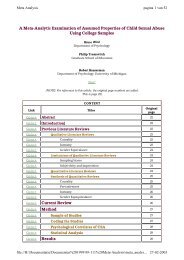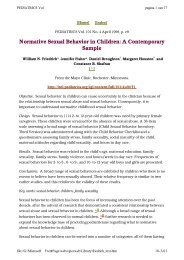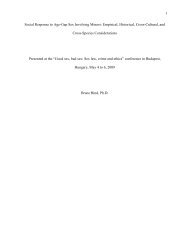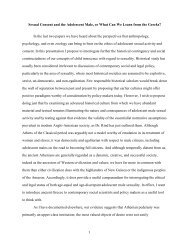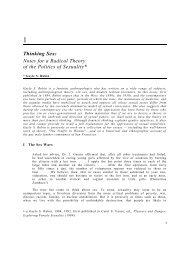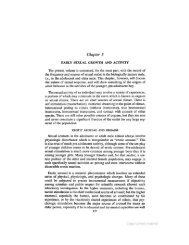Infant and Child Sexuality: A Sociological Perspective - Ipce
Infant and Child Sexuality: A Sociological Perspective - Ipce
Infant and Child Sexuality: A Sociological Perspective - Ipce
You also want an ePaper? Increase the reach of your titles
YUMPU automatically turns print PDFs into web optimized ePapers that Google loves.
healthy force in the positive development of personality. (Ribble,<br />
1955). <strong>Infant</strong> sexual behavior, in the eyes of many, is negative, perverse,<br />
<strong>and</strong> destructive. Some see infant sexual-affectional potential as<br />
related to excesses--addictions that control the individual <strong>and</strong> weaken<br />
his reason. That infants have erotic capacity has been pointedly ignored<br />
or overlooked. After an asexual infancy <strong>and</strong> childhood, sex is<br />
supposed to burst out full bloom at puberty or, hopefully, later. Sexual<br />
innocence has been assumed to be the normal <strong>and</strong> appropriate infant<br />
posture. Still earlier, infants were considered as depraved if they<br />
masturbated, asked sex-related questions, or showed any sexual interest<br />
or curiosity. Ignorance was <strong>and</strong> is deemed best to keep dormant any<br />
precocious sexual feelings. It has been taken for granted that other<br />
aspects of physical <strong>and</strong> mental growth would proceed in a gradual way<br />
from birth to full maturity, but knowledge about sexual capacity <strong>and</strong><br />
interest has been either consciously or unconsciously suppressed even<br />
in the community of social <strong>and</strong> behavioral scientists. This is an<br />
enigma, for as early as the turn of the century Bell (1902), Freud<br />
(1905), <strong>and</strong> Moll (1909) were reporting that in infants of suckling age<br />
various parts of the body could give pleasurable sensation <strong>and</strong> romances<br />
did develop in childhood, <strong>and</strong> it was known that “unscrupulous<br />
nurses” had found that they could calm crying babies by stroking their<br />
genitals. Freud observed that sexual behavior of the infant <strong>and</strong> child<br />
not only was ignored but “the educators consider all sexual manifestations<br />
of the child as an ‘evil’ in the face of which little can be accomplished.”<br />
(Freud, 1962, p. 41). To find sexuality suppressed in the<br />
schools is perhaps underst<strong>and</strong>able; to find it largely overlooked in behavioral<br />
<strong>and</strong> social science is more difficult to underst<strong>and</strong> <strong>and</strong> to accept.<br />
What would be the outcome of a concerted effort to give infants the<br />
opportunity to fully develop their capacity for sensory <strong>and</strong> affectional<br />
response? We do not know because we have not apparently wanted<br />
to know. Those who argue that the individual, to be fully human, must<br />
have the opportunities to develop all his capacities argue that this<br />
principle should apply to his sexual capacity as well as to the capacity<br />
of his intellect <strong>and</strong> motor skills. Those who argue for discipline,<br />
self control, <strong>and</strong> the curbing of harmful or socially disruptive human<br />
tendencies, argue that only the minimum of stimulation <strong>and</strong> no erotic<br />
experience should characterize the personal encounters of infants.<br />
Those who opt for restriction of erotic expression in infancy <strong>and</strong><br />
childhood are in the majority in the United States at the present time.<br />
In a recent survey of sex attitudes, for instance, 90 percent of the<br />
general public judged sexual activities between an adult <strong>and</strong> a child to<br />
be “always wrong.” (Levitt <strong>and</strong> Klassen, 1973).<br />
Of one thing we are certain, empirical behavioral <strong>and</strong> social science,<br />
given the present state of theory, research <strong>and</strong> accumulated findings<br />
on infant sexuality, is in no position to give definitive counsel<br />
to parents, to the school, or to society in general.<br />
Is it even correct to speak of infant sexuality? That depends in<br />
part upon our definition of sexuality. If by the term sexuality we mean<br />
the possession of the biological <strong>and</strong> psychic response system that can<br />
<strong>and</strong> does respond to stimulation by self <strong>and</strong> others <strong>and</strong> that induces infants<br />
to seek <strong>and</strong> even to initiate intimate, affectional encounters<br />
with others, the answer has to be yes. If, on the other h<strong>and</strong>, one uses<br />
the term sexuality to refer to sexual expression that is “a deep <strong>and</strong><br />
23



